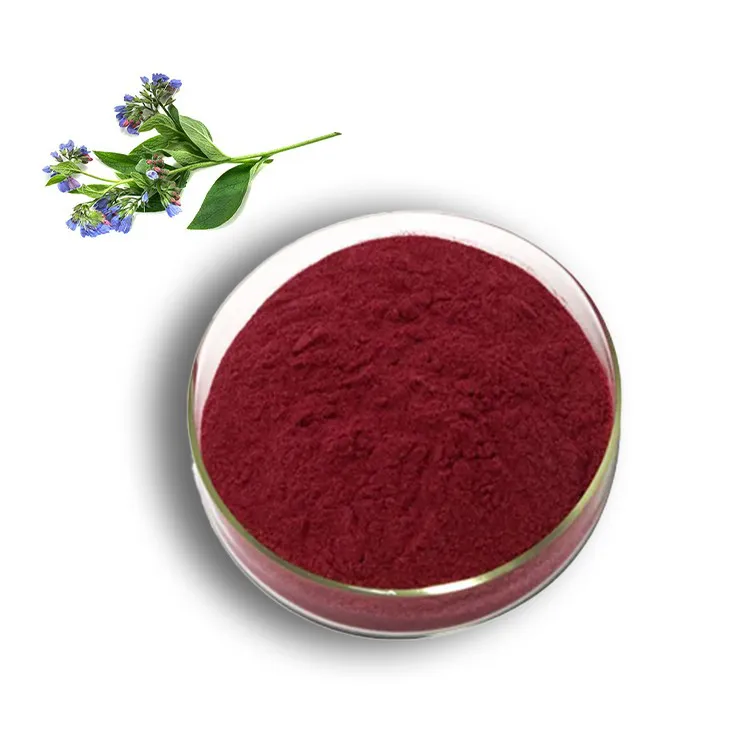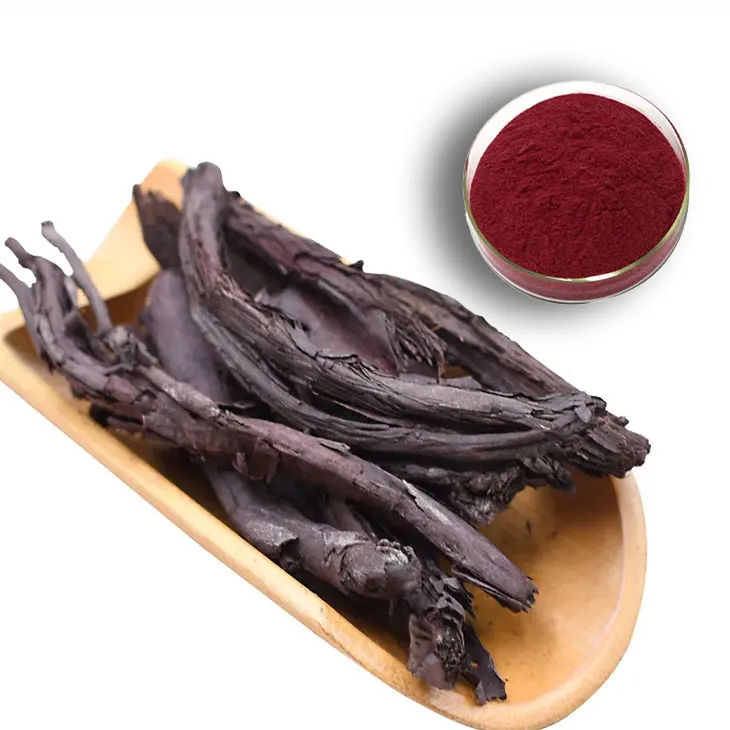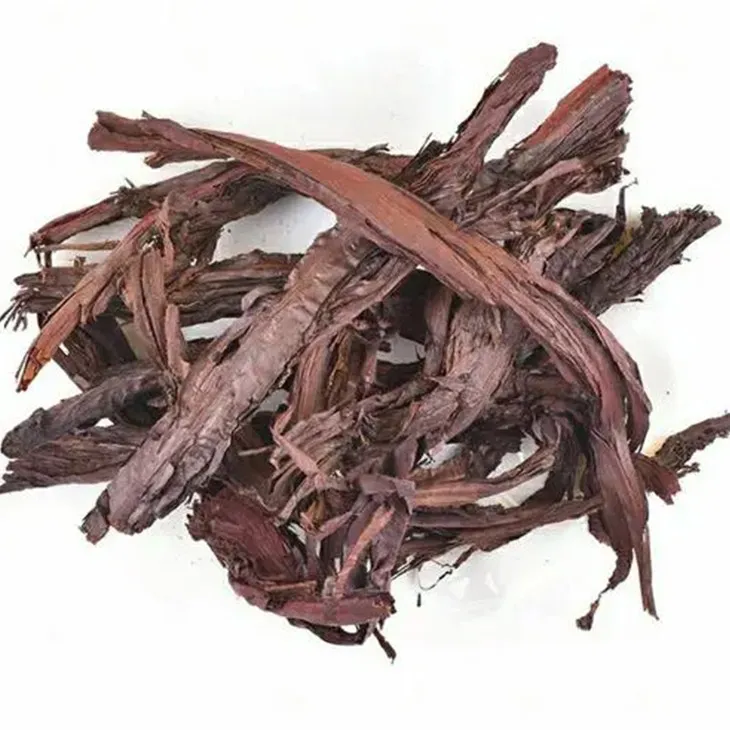- 0086-571-85302990
- sales@greenskybio.com
Organic shikonin: Naturally strengthen the immune system.
2024-11-14

1. Introduction to Organic Shikonin
Organic Shikonin is a fascinating natural compound that has been garnering increasing attention in recent years. It is sourced from plants, specifically from the roots of certain species. For centuries, it has been an integral part of traditional medicine in various cultures. Shikonin's long - standing use in traditional medicine is a testament to its potential therapeutic properties.

2. Antioxidant Properties of Shikonin
Antioxidants play a crucial role in maintaining the health of the body, and shikonin is no exception. Free radicals are highly reactive molecules that can cause significant damage to cells. These free radicals are produced as a by - product of normal cellular metabolism, but they can also be generated due to environmental factors such as pollution, radiation, and smoking.
Shikonin, with its antioxidant properties, acts as a shield against these free radicals. It has the ability to neutralize free radicals, preventing them from causing oxidative stress. Oxidative stress can lead to a variety of health problems, including a weakened immune system. When cells are constantly under attack from free radicals, their normal functions can be disrupted, and this can have a negative impact on the immune cells that are crucial for the body's defense mechanisms.

3. Anti - Inflammatory Effects of Shikonin
Inflammation is a natural response of the body to injury or infection. However, chronic inflammation can be detrimental to the immune system. It can create an environment in the body that suppresses the immune response, making the body more susceptible to diseases.
Shikonin has been found to possess anti - inflammatory effects. It can modulate the body's inflammatory response, reducing excessive inflammation. This is achieved through various mechanisms at the cellular and molecular levels. By reducing inflammation, shikonin helps to create a more favorable environment for the immune system to function optimally.

4. Enhancement of Immune Cell Function
The immune system is a complex network of cells and molecules that work together to protect the body from pathogens. Two important types of immune cells are macrophages and lymphocytes.
4.1 Macrophages
Macrophages are the first line of defense against invading pathogens. They are responsible for engulfing and destroying foreign substances in the body. Shikonin has been shown to enhance the function of macrophages. It can improve their ability to recognize and phagocytose (engulf) pathogens more effectively. This means that macrophages can more efficiently clear out harmful bacteria, viruses, and other foreign invaders, thereby strengthening the body's immune defenses.
4.2 Lymphocytes
Lymphocytes, on the other hand, play a crucial role in the adaptive immune response. There are different types of lymphocytes, such as T - cells and B - cells. Shikonin can also enhance the function of lymphocytes. It can stimulate their activation and proliferation, enabling them to mount a more effective immune response against specific pathogens. For example, T - cells can be better equipped to directly kill infected cells, while B - cells can produce more antibodies to neutralize pathogens.
5. Shikonin in Traditional Medicine
In traditional medicine, shikonin - containing plants have been used for a wide range of ailments. In some Asian cultures, for instance, the roots of plants rich in shikonin have been used to treat skin diseases. This is likely due to its anti - inflammatory and antioxidant properties, which can help to soothe irritated skin and promote wound healing.
It has also been used to treat internal disorders. Traditional healers may have used shikonin - based preparations to boost the overall health of the body, which could be related to its potential to strengthen the immune system. Although the understanding of the mechanisms was not as advanced in the past as it is today, the empirical evidence from centuries of use suggests that shikonin has beneficial effects on health.
6. Modern Research on Shikonin and Immunity
Modern scientific research has been delving deeper into the relationship between shikonin and the immune system. Scientists are using advanced techniques to study how shikonin interacts with immune cells at the molecular level.
One area of research focuses on the signaling pathways involved in immune cell activation. Shikonin has been found to influence certain signaling pathways that are crucial for the proper functioning of immune cells. By modulating these pathways, it can enhance the immune response. For example, it may affect the NF - κB signaling pathway, which is involved in the regulation of inflammation and immune cell activation.
Another aspect of research is looking at the long - term effects of shikonin on the immune system. This includes studies on how continuous exposure to shikonin can potentially train the immune system to be more efficient in dealing with pathogens over time. Such research is important for understanding the full potential of shikonin as an immune - boosting agent.
7. Potential Applications of Shikonin in Immune - Related Therapies
Given its ability to strengthen the immune system, shikonin holds great potential for various immune - related therapies.
- Immune - boosting Supplements: Shikonin could be developed into dietary supplements. These supplements could be beneficial for individuals with weakened immune systems, such as the elderly or those recovering from illness. They could provide a natural way to enhance the body's defenses without the side effects often associated with synthetic drugs.
- Treatment of Autoimmune Diseases: In autoimmune diseases, the immune system mistakenly attacks the body's own tissues. Shikonin's ability to modulate the immune response may be harnessed to develop new treatments for autoimmune disorders. By reducing excessive immune activation, it may help to alleviate the symptoms of autoimmune diseases.
- Vaccine Adjuvants: Shikonin may also have potential as a vaccine adjuvant. A vaccine adjuvant is a substance that is added to a vaccine to enhance the immune response to the vaccine antigen. Shikonin could potentially improve the effectiveness of vaccines, ensuring a stronger and more long - lasting immune response against the targeted pathogens.
8. Safety and Precautions
While shikonin shows great promise in strengthening the immune system, it is important to consider its safety and any potential precautions.
In general, when used in appropriate doses, shikonin has been shown to be relatively safe. However, like any natural compound, it may cause allergic reactions in some individuals. People with known allergies to plants from which shikonin is derived should exercise caution.
Additionally, more research is needed to fully understand the long - term effects of shikonin supplementation. Pregnant and breastfeeding women should also consult their healthcare providers before using any shikonin - based products, as there is currently limited data on its safety in these populations.
9. Conclusion
Organic shikonin is a natural compound with a wide range of potential benefits for the immune system. Its antioxidant and anti - inflammatory properties, along with its ability to enhance immune cell function, make it a promising candidate for natural immune - boosting strategies. While traditional medicine has long recognized its value, modern research is further uncovering the mechanisms behind its effectiveness.
As research continues, the potential applications of shikonin in immune - related therapies are likely to expand. However, safety considerations must always be taken into account. Overall, shikonin offers a natural alternative for those looking to strengthen their immune system in a more holistic way, and it represents an exciting area of study in the field of immunology and natural medicine.
FAQ:
What is organic shikonin?
Organic shikonin is a natural compound derived from plants. It has been used in traditional medicine for centuries and is known for its various beneficial properties related to the immune system.
How does shikonin strengthen the immune system?
Shikonin strengthens the immune system in multiple ways. It has antioxidant properties that combat free radicals which could damage cells and weaken the immune system. It also has anti - inflammatory effects, reducing inflammation in the body that might suppress the immune response. Additionally, it can enhance the function of immune cells like macrophages and lymphocytes, helping them better recognize and fight off pathogens.
Are there any side effects of using shikonin to boost the immune system?
While shikonin is generally considered a natural and relatively safe option, more research is needed to fully understand any potential side effects. As of now, in the context of its use for immune system strengthening, no major side effects have been widely reported, but individual reactions may vary.
Can shikonin be used as a sole method to boost immunity?
Shikonin can be a part of a holistic approach to boost immunity. However, it may not be sufficient as a sole method. A healthy lifestyle including a balanced diet, regular exercise, and proper sleep also play crucial roles in maintaining a strong immune system.
How is shikonin different from other immune - boosting substances?
Shikonin is different from other immune - boosting substances as it is a natural compound with specific antioxidant, anti - inflammatory and immune cell - enhancing properties. Other substances may work through different mechanisms or may be synthetic in nature. Shikonin's origin from plants and its long - standing use in traditional medicine also set it apart.
Related literature
- Title: The Immunomodulatory Effects of Shikonin: A Review"
- Title: "Shikonin: A Natural Compound with Promising Health Benefits"
- Title: "Organic Shikonin and Immune System Function: Current Research"
- ▶ Hesperidin
- ▶ citrus bioflavonoids
- ▶ plant extract
- ▶ lycopene
- ▶ Diosmin
- ▶ Grape seed extract
- ▶ Sea buckthorn Juice Powder
- ▶ Beetroot powder
- ▶ Hops Extract
- ▶ Artichoke Extract
- ▶ Reishi mushroom extract
- ▶ Astaxanthin
- ▶ Green Tea Extract
- ▶ Curcumin Extract
- ▶ Horse Chestnut Extract
- ▶ Other Problems
- ▶ Boswellia Serrata Extract
- ▶ Resveratrol Extract
- ▶ Marigold Extract
- ▶ Grape Leaf Extract
- ▶ blog3
- ▶ blog4
- ▶ blog5
-
Organic Tongkat Ali extract powder factory.
2024-11-14
-
How to make powder with ashwagandha extract.
2024-11-14
-
Rosehip extract manufacturers from China.
2024-11-14
-
The best cat's claw extract in nature.
2024-11-14
-
Chinese Dandelion Leaf Extract Suppliers.
2024-11-14
-
Nettle Root Extract
2024-11-14
-
Beta Carotene
2024-11-14
-
Ivy Extract
2024-11-14
-
Mulberry Extract
2024-11-14
-
Hops Extract
2024-11-14
-
Shikonin
2024-11-14
-
White mustard seed extract
2024-11-14
-
Baicalin
2024-11-14
-
Alisma Extract
2024-11-14
-
Eucommia Ulmoides Extract
2024-11-14




















